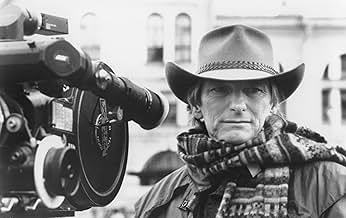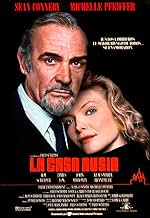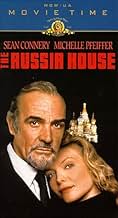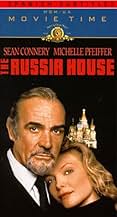IMDb-BEWERTUNG
6,1/10
19.012
IHRE BEWERTUNG
Ein im Ausland lebender britischer Verleger arbeitet unerwartet für den britischen Geheimdienst, um gegen Menschen in Russland zu ermitteln.Ein im Ausland lebender britischer Verleger arbeitet unerwartet für den britischen Geheimdienst, um gegen Menschen in Russland zu ermitteln.Ein im Ausland lebender britischer Verleger arbeitet unerwartet für den britischen Geheimdienst, um gegen Menschen in Russland zu ermitteln.
- Regie
- Drehbuch
- Hauptbesetzung
- Auszeichnungen
- 1 Gewinn & 5 Nominierungen insgesamt
Ian McNeice
- Merrydew
- (as Ian McNiece)
Peter Marinker
- U.S. Scientist
- (as Peter Mariner)
Empfohlene Bewertungen
The Russia House
I must confess, this is easily my favourite film. I have watched only a handful of films more than once. This film I have watched at least twenty times but by the time you read this it will be many more since I watch it at least every 6 weeks or so. I sit down with a bottle of genuine Russian vodka, a small tin of red caviar and some hard white bread, I turn up the dolby 5.1 and soak up the experience. Why is this film so good? Well for a start it is from a book by John LeCarre who must be our best living author. Who else researches a book so thoroughly? Every location has been checked, every character totally believable, with an intelligent plot.
Secondly the screenplay by Tom Stoppard is faultless. Having read the book first, I could not believe how faithfully Stoppard made his screenplay- chunks of LeCarre dialogue are faithfully copied. Then there is the acting. There are memorable performances from Sean Connery (Barley) and Michel Pfeiffer(Katya), the beautiful Russian heroine. Klaus Maria Brandauer wins my "best supporting actor" award as the totally believable Russian scientist. There are so many memorable lines of dialogue in this film. Brandauers line "If I will be a hero, will you act like a merely decent human being" always brings a lump to my throat. Barley's tongue in cheek replies to his CIA interrogators are wonderful. What gives this film such a feeling of authenticity are the locations which are all genuine Moscow and St Petersburg. Already Moscow has changed a lot since this film was made. The lovely old National hotel shown in the film has been demolished and replaced with a modern nonentity, so this film is rapidly becoming a piece of history. The buildings are changing but the same faceless KGB operators are still there. How can one flawed man fight the power of the spymasters. Barley shows how to do it. What a hero! Does it have any faults?If only Ken Russell had stuck to directing and left acting to actors.
I must confess, this is easily my favourite film. I have watched only a handful of films more than once. This film I have watched at least twenty times but by the time you read this it will be many more since I watch it at least every 6 weeks or so. I sit down with a bottle of genuine Russian vodka, a small tin of red caviar and some hard white bread, I turn up the dolby 5.1 and soak up the experience. Why is this film so good? Well for a start it is from a book by John LeCarre who must be our best living author. Who else researches a book so thoroughly? Every location has been checked, every character totally believable, with an intelligent plot.
Secondly the screenplay by Tom Stoppard is faultless. Having read the book first, I could not believe how faithfully Stoppard made his screenplay- chunks of LeCarre dialogue are faithfully copied. Then there is the acting. There are memorable performances from Sean Connery (Barley) and Michel Pfeiffer(Katya), the beautiful Russian heroine. Klaus Maria Brandauer wins my "best supporting actor" award as the totally believable Russian scientist. There are so many memorable lines of dialogue in this film. Brandauers line "If I will be a hero, will you act like a merely decent human being" always brings a lump to my throat. Barley's tongue in cheek replies to his CIA interrogators are wonderful. What gives this film such a feeling of authenticity are the locations which are all genuine Moscow and St Petersburg. Already Moscow has changed a lot since this film was made. The lovely old National hotel shown in the film has been demolished and replaced with a modern nonentity, so this film is rapidly becoming a piece of history. The buildings are changing but the same faceless KGB operators are still there. How can one flawed man fight the power of the spymasters. Barley shows how to do it. What a hero! Does it have any faults?If only Ken Russell had stuck to directing and left acting to actors.
An American spy drama and romance; A story about a British publisher persuaded to go undercover to investigate the motive of an author who is exposing Soviet secrets. Adapted from John le Carré's novel, a compelling glossy drama with a theme about the resurrection of buried hopes by betrayal. It is notable for capturing a plausibility of the realities of the time-Perestroika and post-glasnost Russia. The direction is subtle for a story that is reserved, though it occasionally gets sluggish in the plot with its standard-fare espionage. What carries the film, though, is the character-driven intrigue, witty dialogue, and strong emotional core. Connery's performance is complex, as the flawed publisher is attracted to Pfeiffer's charming go-between, a performance that is also persuasive and credible. There is fine support from Klaus Maria Brandauer as the mysterious scientist and Roy Scheider and James Fox as the bickering spy chiefs under pressure. Aside from the escapism and beautiful locales, easily the most exquisite filmic element is the critically acclaimed musical score by Jerry Goldsmith, which sweeps the audience along through the mood of places, national characteristics, and the main character's relationship.
Lights Up the Screen. Much better after a 2nd or 5th time viewing ! Volume On High
First Saw 30 years ago. Aging well The Movie Stars Shine
7hbs
Maybe I was just in the right mood, but I found this an effective romance. Michelle Pfieffer was even better than her usual terrific self, and the rest of the excellent cast was, well, excellent. It is pretty slow, but I think that this is essential to the conclusion, which I found quite moving. You have to give this movie a chance to grow on you, but if you are patient it is quite accessible. Not bleak at all, as you'd expect from Le Carre.
My first comment for this site....exciting stuff.
Prompted to write this by seeing this again on video - the third time for me, and it's rare that I want to see anything three times. And I realized that it's fascination still holds....this is one of my top 10, definitely.
The reasons I would rate this a "9", while somebody else would give it a "5.9" are largely personal....i think it always comes down to the personal. Talk all we want, when we watch a movie - as when we eat a meal, or kiss someone - the pleasure center in the brain either lights up or doesn't. For me it's all about the love of a place...for Scott Barley Blair it's early Glastnost Russia, for me it's 90's Germany - Hamburg, Berlin...the strangeness, the trueness of people who surround you in such a place and your love for them because of this. The fact that a film can light up specific sense memories like these means that it is true - at least in that respect. This is a remarkably honest film - terrifically unsensational for a spy film and one of the rare "love stories" that delivers the satisfactions expected of a "love story" without getting mawkish. Everything rings true here except for the ending (a fabricated "happy ending" which is the only thing that kept me from rating this a 10).
To ask for Manchurian Candidate type excitement from this low key film is wrong. The suspense, which is remarkably sustained (those rich long tracking shots of people walking through public places to uncertain destinations to meet with, or maybe not meet with shadow characters who may be allies or enemies) is the truer suspense of the uncertainty of living in a gray, gray world...where nothing much happens, but peril is part of the fabric of mundane life.
(Those sequences are gorgeous....the colors of autumn in a Leningrad park, the closeups of the stone gargoyles....the moody circular stepping pace of the soundtrack....Branford Marsalis' saxophone.) Someone has said here that it is talky. Yes, it is talky...but the talk is brilliant...it is the perfect reflection of a world where everyone - book publishers and bureaucrats and spies alike speaks in mannered, ritualized streams of code. This is not disinformation - it is perfectly understood by all, a language that has supplanted the language of an earlier age in which sincerity was an option.
Besides that ending, the piece is perfectly faithful to LeCarre's novel. LeCarre's books have had good luck when being translated into movies. Of the eight or so that have been adapted, four have made great films: The Spy Who Came into the Cold, The Russia House, and the two George Smiley BBC miniseries. LeCarre is a great writer and more specifically great at plotting and dialogue, and these films all succeed pretty much by filming what is written unadorned and pouring on the atmosphere. And they are blessed with lead performances by three great actors at the top of the form - Richard Burton, Sean Connery and Alec Guiness (Guiness especially...to watch him for six hours in Smiley's People is one of the great pleasures).
A beautifully efficient and elegant translation by Tom Stoppard of a great novel, wonderfully dignified and touching performances by Connery and Michelle Pfeiffer (never seen her better), a beautiful soundtrack by a second tier composer graced by the presence of a real jazz master, a terrific evocation of a place and time....a very moving film.
Prompted to write this by seeing this again on video - the third time for me, and it's rare that I want to see anything three times. And I realized that it's fascination still holds....this is one of my top 10, definitely.
The reasons I would rate this a "9", while somebody else would give it a "5.9" are largely personal....i think it always comes down to the personal. Talk all we want, when we watch a movie - as when we eat a meal, or kiss someone - the pleasure center in the brain either lights up or doesn't. For me it's all about the love of a place...for Scott Barley Blair it's early Glastnost Russia, for me it's 90's Germany - Hamburg, Berlin...the strangeness, the trueness of people who surround you in such a place and your love for them because of this. The fact that a film can light up specific sense memories like these means that it is true - at least in that respect. This is a remarkably honest film - terrifically unsensational for a spy film and one of the rare "love stories" that delivers the satisfactions expected of a "love story" without getting mawkish. Everything rings true here except for the ending (a fabricated "happy ending" which is the only thing that kept me from rating this a 10).
To ask for Manchurian Candidate type excitement from this low key film is wrong. The suspense, which is remarkably sustained (those rich long tracking shots of people walking through public places to uncertain destinations to meet with, or maybe not meet with shadow characters who may be allies or enemies) is the truer suspense of the uncertainty of living in a gray, gray world...where nothing much happens, but peril is part of the fabric of mundane life.
(Those sequences are gorgeous....the colors of autumn in a Leningrad park, the closeups of the stone gargoyles....the moody circular stepping pace of the soundtrack....Branford Marsalis' saxophone.) Someone has said here that it is talky. Yes, it is talky...but the talk is brilliant...it is the perfect reflection of a world where everyone - book publishers and bureaucrats and spies alike speaks in mannered, ritualized streams of code. This is not disinformation - it is perfectly understood by all, a language that has supplanted the language of an earlier age in which sincerity was an option.
Besides that ending, the piece is perfectly faithful to LeCarre's novel. LeCarre's books have had good luck when being translated into movies. Of the eight or so that have been adapted, four have made great films: The Spy Who Came into the Cold, The Russia House, and the two George Smiley BBC miniseries. LeCarre is a great writer and more specifically great at plotting and dialogue, and these films all succeed pretty much by filming what is written unadorned and pouring on the atmosphere. And they are blessed with lead performances by three great actors at the top of the form - Richard Burton, Sean Connery and Alec Guiness (Guiness especially...to watch him for six hours in Smiley's People is one of the great pleasures).
A beautifully efficient and elegant translation by Tom Stoppard of a great novel, wonderfully dignified and touching performances by Connery and Michelle Pfeiffer (never seen her better), a beautiful soundtrack by a second tier composer graced by the presence of a real jazz master, a terrific evocation of a place and time....a very moving film.
Wusstest du schon
- WissenswertesThe meaning and relevance of the title "The Russia House" is that it refers to the nickname given to the section of the British Secret Service that was assigned to investigating the Soviet Union.
- PatzerDuring Blair's "start the avalanche" speech, Dante is seen at the end of the table. As the camera pans around the table during the speech, Dante disappears from the end of the table, and then reappears.
- Crazy CreditsThe credits appear over a series of clips showing location shots from the film, concluding with a repeat of the final scene.
- VerbindungenFeatured in A Tribute to Sean Connery (1990)
Top-Auswahl
Melde dich zum Bewerten an und greife auf die Watchlist für personalisierte Empfehlungen zu.
Details
- Erscheinungsdatum
- Herkunftsland
- Offizieller Standort
- Sprachen
- Auch bekannt als
- The Russia House
- Drehorte
- Lissabon, Portugal(on location)
- Produktionsfirmen
- Weitere beteiligte Unternehmen bei IMDbPro anzeigen
Box Office
- Budget
- 21.800.000 $ (geschätzt)
- Bruttoertrag in den USA und Kanada
- 22.997.992 $
- Eröffnungswochenende in den USA und in Kanada
- 4.435.650 $
- 25. Dez. 1990
- Weltweiter Bruttoertrag
- 22.997.992 $
Zu dieser Seite beitragen
Bearbeitung vorschlagen oder fehlenden Inhalt hinzufügen

Oberste Lücke
By what name was Das Russland-Haus (1990) officially released in India in Hindi?
Antwort





































